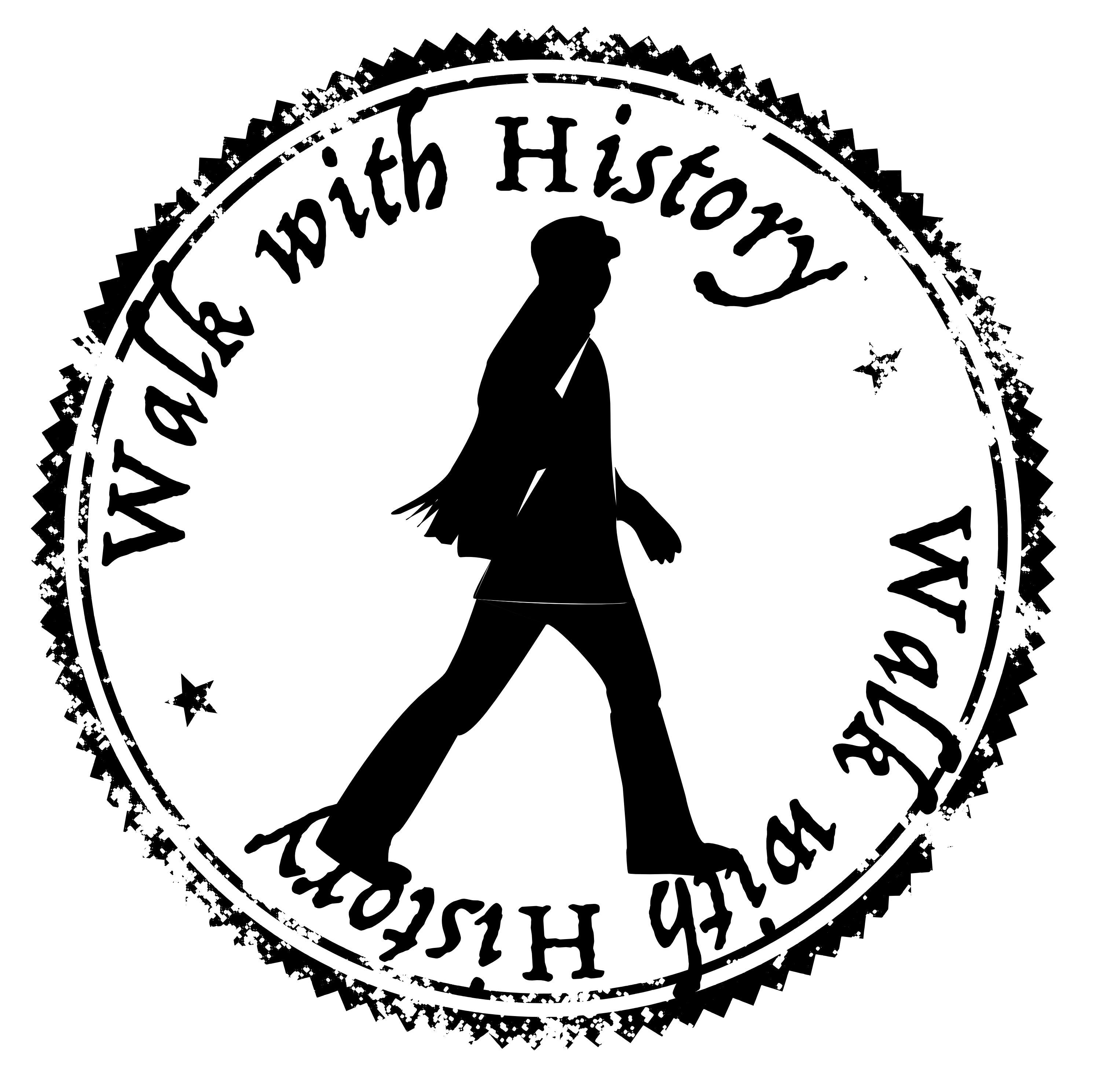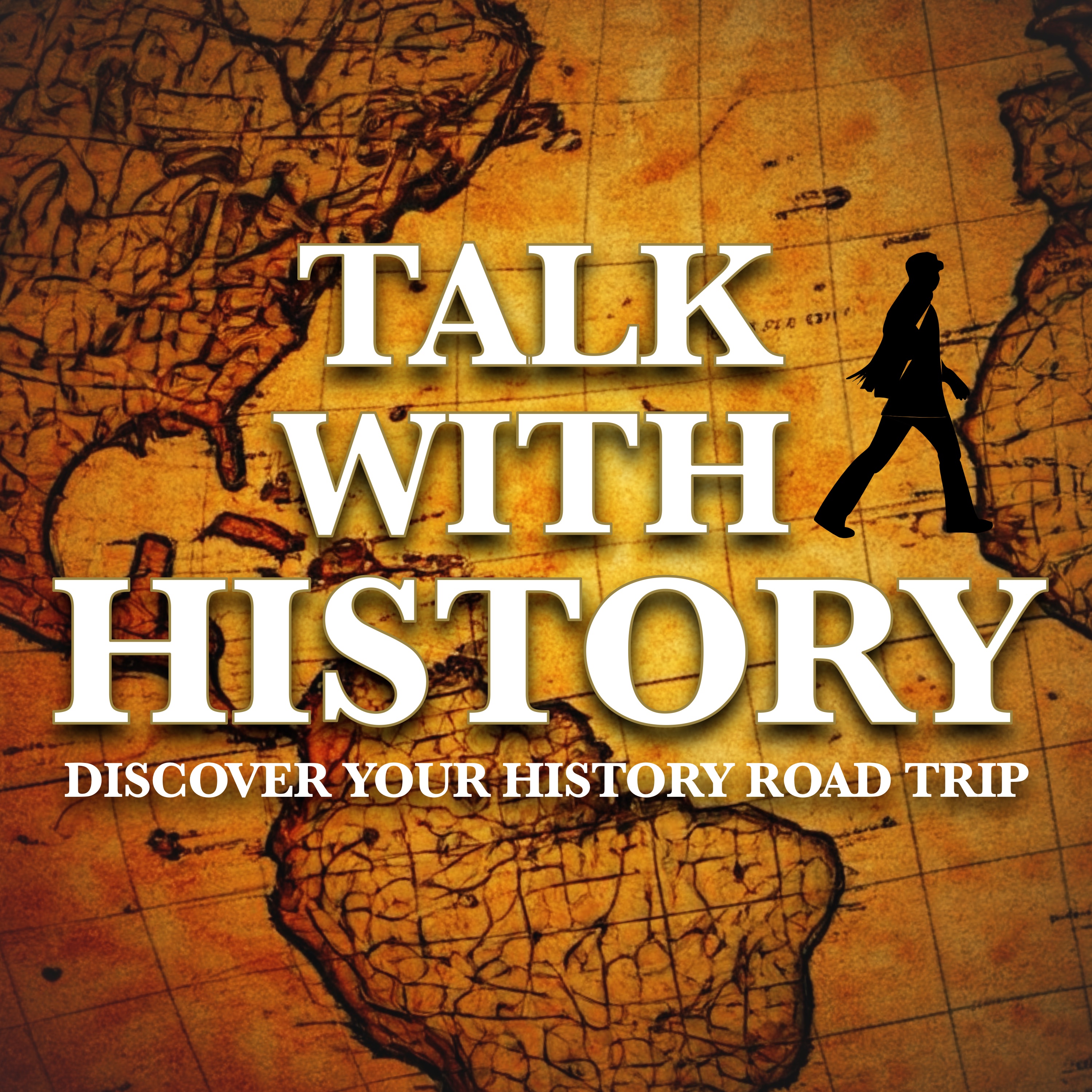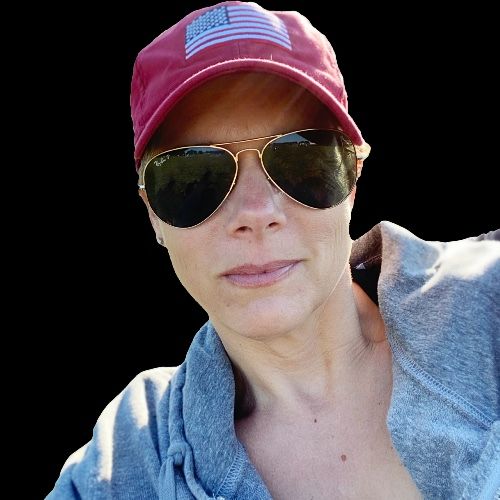An OK Corral witness, WWII Ghost Army, and Civil War Family Ties (50th Episode Look Back)
➡️ Help history. 2 minutes for 7 questions 🫡
50 episodes in we revisit some fascinating stories from guests we have interviewed. One had a grandmother at the OK Corral, the next guest tells us all about the WWII Ghost Army, and our last guest has an amazing tie to Civil War history.
Even if you have heard all the other 49 Talk with History episodes...these stories are worth hearing again!
Find our Guests here:
The History Chick 1941 (Instagram)
-------------------------------------------------------
⬇️ Help us keep the show going and explore history with us! ⬇️
🧳 Plus...get free travel resources in your inbox.
-------------------------------------------------------
📧 contact: talkwithhistory@gmail.com
Talk with History is a global Top 40 History podcast on Feedspot!
Transcript
Welcome to talk with history.
Speaker:I'm your host Scott.
Speaker:And tonight I am not here with my wife and historian, Jen.
Speaker:Jenn is out of town.
Speaker:And so I thought for our 50th episode, we could look back on
Speaker:some of our favorite episodes.
Speaker:Tonight, we're going to look back on some fun stories from guests
Speaker:we've interviewed in the past.
Speaker:We'll start with Lisa from historical USA, talking about some very
Speaker:exciting and interesting family history that caught us off guard.
Speaker:After that we'll look back on some world war II conversations we had
Speaker:with Sarah, the history check 1941.
Speaker:And last, but certainly not least.
Speaker:We'll look back on some civil war, family history ties from
Speaker:J D of the history underground.
Speaker:I hope you enjoy.
Speaker:Okay.
Speaker:So you mentioned earlier my, my, one of my biggest hobbies is genealogy.
Speaker:Mm-hmm.
Speaker:. Yep.
Speaker:I love genealogy.
Speaker:I know a lot about my family history, and one of the things that I love to tell
Speaker:people is that my great great grandmother
Speaker:saw the shootout at the Okay corral.
Speaker:What, how awesome is that?
Speaker:was like 12 or 13.
Speaker:Her father worked for the silver mines.
Speaker:So Tombstone is a big mining town and that's, it's like, it's a boom town.
Speaker:And so, there was silver mine there and he was a silver miner
Speaker:working for the silver mines.
Speaker:And I mean, you.
Speaker:I think tombstones an awesome
Speaker:Mm-hmm.
Speaker:. Yeah.
Speaker:fun.
Speaker:It is.
Speaker:They have kept that western theme going up,
Speaker:Yeah, we still need to go.
Speaker:Yeah, we're gonna do
Speaker:a walk with history from there.
Speaker:Yeah.
Speaker:Yeah.
Speaker:Go to the bird cage, go to the courthouse.
Speaker:I mean, I've been there.
Speaker:It's, it is it is a desert, desert town, but my grandmother, you
Speaker:know, she was, she was there in tombstone when the, when the okay.
Speaker:Corral when that shootout happened.
Speaker:And the shootout is quite funny because, , you know, there is quite a buildup to it.
Speaker:I mean, there is definitely hostilities happening in the town between the,
Speaker:the two groups, between the brothers and the, the wider and dock holiday.
Speaker:But the shootout lasts for like less than 30 seconds.
Speaker:And it's kind of, and it, it wasn't like out in the street, it was kind
Speaker:of like a ways off in an alley.
Speaker:and you can go and watch the, the recreation of it or the reenactment
Speaker:of it, and it's like, boom.
Speaker:Oh wow.
Speaker:Wow.
Speaker:That, that, that's it.
Speaker:Yeah.
Speaker:you know, but it's the, but it's the history of the lead up.
Speaker:It's
Speaker:The lead up took a while.
Speaker:Yeah.
Speaker:Mm-hmm.
Speaker:up
Speaker:yes.
Speaker:Of this hostility.
Speaker:yeah, Wyatt Earp.
Speaker:And then the courthouse is really interesting too.
Speaker:There is a lot History behind there.
Speaker:You can go there and find a lot of like ghost tours.
Speaker:You can take a lot of ghost tours there.
Speaker:Like the bird cage is haunted as supposedly.
Speaker:And yeah, and all throughout Arizona you're gonna find these like cowboy towns
Speaker:that they've kind of kept up a little bit.
Speaker:So, so your grandma was in Tombstone.
Speaker:How long did she live in Tombstone then?
Speaker:How long was she there in
Speaker:so,
Speaker:your great, great great grandma,
Speaker:She got married very young.
Speaker:She actually married at 14.
Speaker:was probably, it was typical of the.
Speaker:yeah, she wasn't there for very long.
Speaker:Had a couple kids, but she moves to Yuma,
Speaker:Okay.
Speaker:Okay.
Speaker:or, or kind of outside, near the Walton area, a little outside Yuma, Arizona.
Speaker:And that's where my dad's family lived for a very long time.
Speaker:My grandparents were there.
Speaker:So we would go to Yuma and there's, oh, and you can go to like if you've
Speaker:ever seen the movie three 10 to.
Speaker:I love that movie.
Speaker:You so much.
Speaker:Yes.
Speaker:I love it.
Speaker:I was gonna say that actually
Speaker:yeah, you can go to the fort.
Speaker:I mean, the Yuma, Yuma Prison is still there.
Speaker:And so you can go to the fort there and they have a graveyard and stuff,
Speaker:and you can kinda walk around and,
Speaker:So much history, Lisa.
Speaker:what do you remember?
Speaker:Learning about World War II when you were younger and maybe something
Speaker:more that stands out to you now.
Speaker:Maybe your, your kind of favor, world War II history story or, piece of that era.
Speaker:So learning about it.
Speaker:When I was young, it was, it was very basic school learning about.
Speaker:Yep.
Speaker:World War ii.
Speaker:We really didn't learn anything about the Pacific Theater.
Speaker:It was mostly the European theater.
Speaker:We learned Hitler came to power.
Speaker:He invaded Poland.
Speaker:We we got bombed by Pearl Harbor, and then we came into the war.
Speaker:And then then towards the end we learned about the Holocaust.
Speaker:So it really wasn't when I was much, much younger before I got into history,
Speaker:when we were learning about this.
Speaker:It wasn't, I didn't learn a lot about it, but.
Speaker:Learning about it.
Speaker:As I especially got older and learning about how in depth World War II was,
Speaker:it's, it's crazy to me because also you have all of these different operations
Speaker:and , in school we learned that it was pretty much the United States
Speaker:and Britain who were in World War ii.
Speaker:There was nobody else involved.
Speaker:We were the victors.
Speaker:We were the only people that were in World War ii and so, We thought that
Speaker:for a long time, and then realizing how many different countries and
Speaker:allies we had in World War ii.
Speaker:That's just like mind
Speaker:blowing.
Speaker:right?
Speaker:Big one.
Speaker:Yeah.
Speaker:Yeah.
Speaker:Mm-hmm.
Speaker:. Well,
Speaker:We were friends.
Speaker:. Yeah.
Speaker:we, we were, we, were friends, but we were allies.
Speaker:Yeah.
Speaker:But the thing with that is I think Russia kind of looked at whose side should
Speaker:I be on, who is gonna get us farther?
Speaker:Who's gonna win the war.
Speaker:And so that's who they sided with.
Speaker:So that's why they sided with us.
Speaker:They're like, Germany's gonna lose.
Speaker:I'm gonna side with the United States and just kind of go with their thing
Speaker:because they were looking at the long picture and, and the future.
Speaker:, interesting things that I've learned that I think is just probably one
Speaker:of the most fascinating things is the deception tactics before D-Day.
Speaker:The whole deception tactics and that Hitler did think that we were
Speaker:going to invade Pas de Calais.
Speaker:Like, and even when the D-Day landings happened and he heard
Speaker:them happening, he still thought we were going to invade Pas de Calais.
Speaker:And that wasn't it at all, and which is why he kept the Panther Division up.
Speaker:Where it was supposed to be.
Speaker:And if, if he had sent in the Panzer division when they requested
Speaker:it, de the d d-day could have turned out much differently.
Speaker:It's, those, those deception ta tactics were just absolutely insane.
Speaker:Yeah.
Speaker:I love how you love that, Sarah.
Speaker:And I think, you love the Ghost Army.
Speaker:You always talking about the balloons that they used and like
Speaker:the deception that they used.
Speaker:And
Speaker:I'm like, Sarah missed her calling in like Intel because they still, they yeah.
Speaker:Don't, don't get me.
Speaker:yeah.
Speaker:They still do that today.
Speaker:Yeah.
Speaker:Governments still do that today.
Speaker:Army still do that today, believe me.
Speaker:And so it's very interesting that that's something that's very useful
Speaker:and it's a tactic when you look at satellite pictures, is that real or
Speaker:are they just trying to deceive us?
Speaker:It just.
Speaker:you're buying the balloons all the time of
Speaker:It is.
Speaker:They were, they were in, they were in, inflatable tanks
Speaker:and it, it, the ghost Army was made up of artists and engineers.
Speaker:They weren't made up of, GI Joe combat soldiers, even though they, you know,
Speaker:they went through basic training and, and had some, had to learn combat and stuff.
Speaker:But they were.
Speaker:Artists and teachers and painters.
Speaker:And th that's what made up, yeah, made up the ghost army.
Speaker:And they just, these deception tactics of, creating whole fake
Speaker:military encampments motor pools.
Speaker:They had ships like, and then the sound, the, the gigantic speakers
Speaker:that would do sound of soldiers, footsteps and radio chatter.
Speaker:And they created fake insignia and went to town and started getting
Speaker:all chummy with the town folks.
Speaker:Seen, so a spy was there.
Speaker:They'd be like, oh no.
Speaker:Like this is one of Patton's, armies and ,all that stuff.
Speaker:It's just so crazy.
Speaker:But I actually heard a very interesting story about England
Speaker:and World War ii just the other day
Speaker:. A story about a toy maker during World War II who was asked to make kind of
Speaker:like a scale size model of the coast of like all the, the English coast
Speaker:in France and in the various coasts.
Speaker:By, by the, the British government.
Speaker:, by the army, by the Navy.
Speaker:Mm-hmm.
Speaker:And so this toy maker, he's, he's making this kind of scale size
Speaker:model of the coast, and he assumed right as so that they could do their
Speaker:planning and this, that and the other.
Speaker:And so this toy maker finishes it up whenever it is.
Speaker:It's late at night, but he's, it's in a rush cuz everything, back then they
Speaker:tried to, tried to do it now, now, now.
Speaker:So he had it in his, in the back of his truck driving up to the Portsmouth.
Speaker:and there's a midshipman.
Speaker:So this is someone who's not even technically like a, a
Speaker:full blown naval officer yet.
Speaker:So there's a midshipman at, it's in the middle of the night, it's like midnight,
Speaker:who's kind of standing gate guard.
Speaker:And so they, they stop him there and they're, they're kind of looking,
Speaker:they're like, what are you bringing?
Speaker:He's like, oh, I'm bringing this, scale, size.
Speaker:Model or whatever like that of the coast and they, they look in the back, this
Speaker:midshipman, so he's, he's thinking, he's like, well, we don't need the whole coast.
Speaker:We just need
Speaker:Normandy.
Speaker:And then he realizes right then and there what he just said, cuz
Speaker:Normandy was in like six months.
Speaker:So he's like, oh no, I just gave away
Speaker:what's gonna happen in six months.
Speaker:No, I must lock you the two up for six months,
Speaker:. So that's exactly what they did.
Speaker:Hey, really?
Speaker:I just, I didn't even hear
Speaker:Oh my
Speaker:That's, exactly what they did.
Speaker:That's what they were like.
Speaker:Bring your stuff on in and that guy didn't leave the base for
Speaker:six months until after Normandy.
Speaker:You've seen too much . This is this, I, I, apparently it's like a legit true story.
Speaker:I tried to look it up online earlier today.
Speaker:Mm-hmm.
Speaker:and I couldn't find it.
Speaker:So maybe this is one of those like, kind of urban legends that's been passed down,
Speaker:in the Navy or in the military over there.
Speaker:But I believe it.
Speaker:I believe it cuz I believe him at Shipman would be that dumb.
Speaker:Talk about a crazy story, right
Speaker:That is Well, I
Speaker:and it, and.
Speaker:And, and to your point into like all the deception and this, that and the other.
Speaker:Mm-hmm.
Speaker:, that stuff was like really tightly controlled cuz it was so important at the
Speaker:time and no one knew who the spies were.
Speaker:Right.
Speaker:The spies were so deeply embedded.
Speaker:Right.
Speaker:Both sides really feel p grounded in their cause.
Speaker:Yeah.
Speaker:Right.
Speaker:The Nazis feel very grounded there.
Speaker:Cause the British feel, Americans feel.
Speaker:, the spies are deeply embedded, right?
Speaker:And so, yeah, you have to really be careful of who you're talking to.
Speaker:So what's a bit of regional history that you think might fall into that category?
Speaker:Like I said, I grew up in Missouri and we got a little,
Speaker:we've got civil war history here.
Speaker:. Yeah.
Speaker:But it's, it's different than the Civil War history, like out where
Speaker:you all are on the East Coast.
Speaker:Sure.
Speaker:Yeah.
Speaker:We, out on the East coast, there's a lot of, big huge epic battles and, . the
Speaker:formations that you typically think of.
Speaker:Whenever you watch Civil War movies out here, , it was just a lot of
Speaker:bush wacking and burning people's farms down and country bands.
Speaker:More people more spreading, all banned.
Speaker:It was, yeah.
Speaker:Yeah.
Speaker:I have an ancestor who was has kind of a neat story.
Speaker:There's a, there's a highway state highway, oh, it's
Speaker:probably about 30 miles from me.
Speaker:And off on the side of the road there's a confederate grave marker and Oh wow.
Speaker:It says here, the bodies of three unknown Confederate soldiers.
Speaker:Well, my great, great great grandma buried those men in, in that grave.
Speaker:Wow.
Speaker:Wow.
Speaker:And there's actually two, the, the grave markers wrong.
Speaker:There's, there's actually two in there instead of three.
Speaker:But, but the story is her husband was off to war.
Speaker:This whole area was filled with a bunch.
Speaker:Confederate gorillas and mm-hmm.
Speaker:, it, it was just bordering on anarchy around here.
Speaker:Mm-hmm.
Speaker:is a dangerous place to be, but.
Speaker:She overnight would run supplies through the lines.
Speaker:Yep.
Speaker:Because women, they,
Speaker:they were suspected woman.
Speaker:It's an article about Missouri women running.
Speaker:Oh, I have to check that out.
Speaker:Oh, really?
Speaker:I, I, I have to say, yeah, I'll have to send it to you.
Speaker:J I read it in grad school, so I have it.
Speaker:I had to read it for school.
Speaker:School.
Speaker:I would love to
Speaker:see that.
Speaker:. Yeah.
Speaker:So, so yeah, my, my great-great-great grandma would've been one of those women.
Speaker:That's awesome.
Speaker:So she was getting like quinine medicine and mm-hmm.
Speaker:, food supplies and stuff like that.
Speaker:Holy cow.
Speaker:Holy cow.
Speaker:And smuggling them back and forth across the lines.
Speaker:Well, one day she came across these dead Confederate soldiers and knew that
Speaker:if these confederate gorillas came.
Speaker:Found these dead confederates that they would likely come into the
Speaker:town and burn it down or hang some of the men or something like that.
Speaker:And they said that she was a, a short woman but, but real strong and, spunky.
Speaker:And so, so she buried those men they're at, at that grave.
Speaker:And,
Speaker:That's awesome.
Speaker:Did you do a yeah.
Speaker:So, so how, so did you do an episode?
Speaker:? Not yet.
Speaker:I'm, I'm going to, oh, at some
Speaker:point.
Speaker:Yeah.
Speaker:So, so was that kind of like a, I, that's like the perfect example.
Speaker:Family, like regional, local, family history, family, right?
Speaker:Mm-hmm.
Speaker:that's like super local, super hyper relevant.
Speaker:So was that just kind of like a family story that was
Speaker:kind of just verbally passed
Speaker:down?
Speaker:Yep.
Speaker:That, that was one of my grandpa.
Speaker:My grandpa took me out there and showed me whenever I was really young how cool.
Speaker:Turkey gun and.
Speaker:in, in Missouri.
Speaker:You you have to stop hunting at one o'clock.
Speaker:Yeah.
Speaker:So after one o'clock we got done Turkey hunting and he said, Hey
Speaker:he said, let's run out here and I'm gonna show you something.
Speaker:And I was, I was five years old.
Speaker:Wow.
Speaker:Whenever he took me out there.
Speaker:And it, it was really funny.
Speaker:I hadn't been back.
Speaker:My grandpa passed away a couple years ago.
Speaker:But I wanted to, to show my.
Speaker:and yeah, I wa I was able to take them right back to that spot.
Speaker:Like it had that much of an impression on me.
Speaker:Oh, wow.
Speaker:So I had been there, over 35 years yeah.
Speaker:But was able to take 'em back.
Speaker:That, that's, and that's so interesting too, that.
Speaker:, the, the more, again, from the, the non-story buff guy here.
Speaker:Right.
Speaker:The more I learn about history, and we either come across memorials mm-hmm.
Speaker:or monuments, and Jen is educating me multiple times because she talks
Speaker:about it before we go and then we have to record it, and then I'm editing.
Speaker:And so I, so I actually learned a lot more history than than I ever expected.
Speaker:But I, but I learned.
Speaker:Not just the famous battles, not just the big names that we all hear about, right?
Speaker:Mm-hmm.
Speaker:, the, the generals and the, pickets charge mm-hmm.
Speaker:and this, that, and the other, but also all the, the supporters
Speaker:and, and the, the women.
Speaker:And the kids.
Speaker:Mm-hmm.
Speaker:and the communities and what they did during these monumental
Speaker:times and these dangerous times.
Speaker:I mean, your great-great-great grandma was like a super badass.
Speaker:She's burying guys in the middle of the night.
Speaker:Yeah.
Speaker:To protect her town.
Speaker:Yeah.
Speaker:Because she knew that there would be retribution if they were found.
Speaker:Yeah.
Speaker:Yep.
Speaker:So, so to me, that's the kind of stuff that.
Speaker:Until you really kind of get to kind of live in some of this, this
Speaker:history stuff, or you watch some, some of the good, videos that I'll
Speaker:say, well, the three of us make No, I'll just throw that out there.
Speaker:I think we're working to get up to your level, jd, we're getting there.
Speaker:I know, but,
Speaker:I think your stuff is great.
Speaker:Thank you.
Speaker:Thank you.
Speaker:The, if, if you get to watch, that's, that's one of the things that I've really
Speaker:enjoyed, I, I have enjoyed about doing this history stuff is, is learning those
Speaker:little tidbits and seeing like, man, there's, there's so many more key players
Speaker:in these large historical events and times and periods than we ever really realized.
Speaker:Mm-hmm.
Speaker:that a lot of people realize and, and your family.
Speaker:Right.
Speaker:You're you've got family that, that Yeah.
Speaker:Are point directly to that.
Speaker:That's a great,
Speaker:that's really good.
Speaker:I'll find that article for you cuz I, it probably even, you'll be surprised,
Speaker:like, this mentions my grandma . Oh man.
Speaker:If it does, that'll be one.
Speaker:Yeah.
Speaker:Yeah.
Speaker:But I don't know if it just in, it is kind of interesting as we've been
Speaker:sitting here talking, I didn't even think about this until just a little bit ago.
Speaker:But if you'll notice whenever I'm talking about where I've learned
Speaker:a lot of my history and, and stuff like that, I haven't really
Speaker:mentioned anything about a classroom.
Speaker:A lot of it are, are people in my family or friends or things like that who mm-hmm.
Speaker:, took an.
Speaker:and, and invested in me and passed these stories down to me or, or
Speaker:took me to places that would help.
Speaker:Mm-hmm.
Speaker:would help spark my interest.
Speaker:So yeah, there's, there's definitely a place for classroom learning
Speaker:and, and everything like that.
Speaker:And I think that's important.
Speaker:But, we're, we're the biggest part of my learning has taken place,
Speaker:has been outside of a classroom.
Speaker:Thank you for listening to the talk with history podcast, and please
Speaker:reach out to us at our website.
Speaker:Talk with history.com, especially for this 50th episode.
Speaker:Thank you so much for joining us.
Speaker:If you know someone else that might enjoy this podcast, please share it with them.
Speaker:Especially if you think today's episode would interest a friend.
Speaker:Shoot him a text and tell him to look up the talk with history podcast, because
Speaker:we rely on you, our community to grow.
Speaker:And we appreciate you all.
Speaker:Every day.





